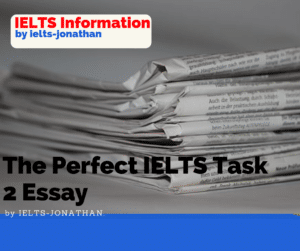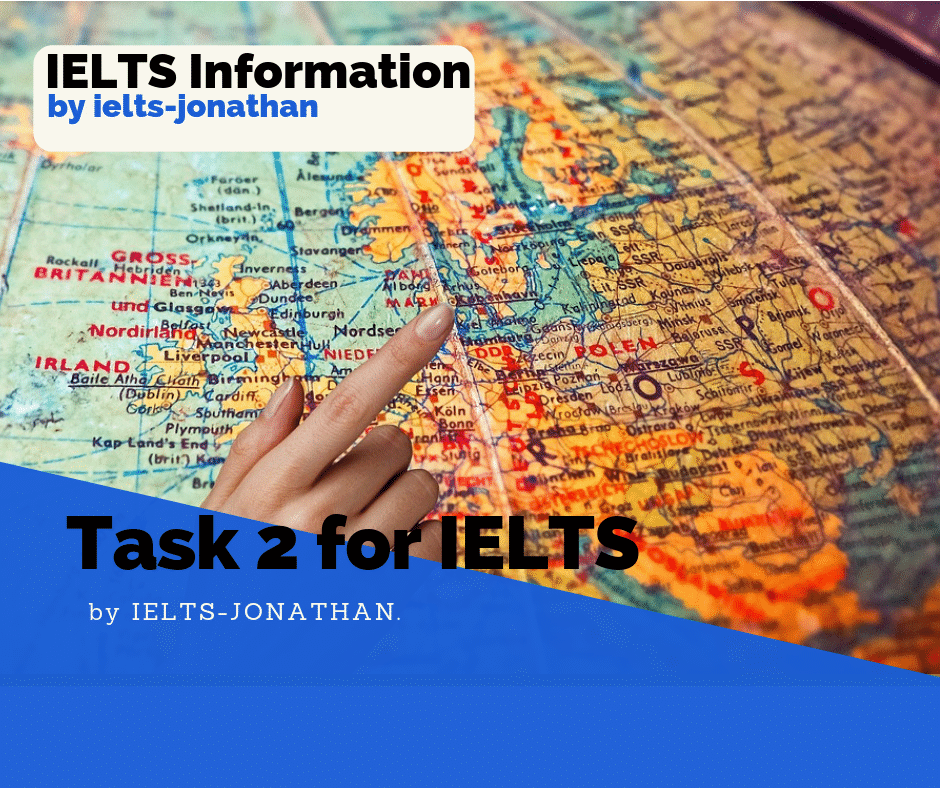Many students are afraid of the second task in IELTS writing.
Why?
Well, Task 2 writing can be challenging for a number of reasons.
You can follow rules and advice, but do you still find it a problem to write 250 words?
Well, maybe you’re not sure you understand
- what you are writing,
- why you’re writing
- and for what purpose?
This post is going to provide a checklist so you can best attempt the task for a high Band Score
- and provide an example essay that answers a specific question
- which displays all the positive features of a high scoring Task 2 response.
I know candidates often struggle to get a good score in Task 2 writing and many don’t know the reason why?
Unlike Task 1, there are no rules to follow, no charts to comment on or features to notice.
In many ways, it’s a very different task and, unlike Task 1, it really does need you to talk about your ideas and opinions.
The first thing to do with any task question is to identify the parts of the question, the instructions and consider your opinion, for example, whether you agree and disagree with the statement presented, or to what extent.
You can do this by reading the question and identifying the topic and using the structure words to plan a line of argument.
You can use your own experience, but it is important to answer the question and answer it fully!
Too often, I see students attempt to answer their own question, be off topic by answering a similar question or even worse, attempt a question memorised from class.
Here is a checklist of the text features to consider in TASK 2
Remember to score highly in Task Achievement have you?
- Clearly stated an opinion
- Discussed both sides to an argument
- Supported both sides of an argument with relevant examples related to the question
- Clearly stated why one side of an argument is right
- Clearly stated why one side of an argument is wrong
- Discussed both the advantages and disadvantages
- or stated to what extent you agree with the question
You can find out more about approaches to Task 2 Writing in this detailed post.
The Best Approach to Task 2 Writing for any candidate.
So, here’s the Question I want to answer:
Studying at university is a great opportunity for all and it’s even more beneficial if the university attended is in a foreign country.
To what extent do you agree?
Here is my Response in four paragraphs.
Embarking on a university career is a very different experience to being a high school student. There are many differences and demands, but most of all, the opportunities it provides are greater. School may offer some extra-curricular activities, but the main function is to pass exams. I would argue that University, while related to a final qualification, offers much more in terms of both personal development and career opportunities and even more so if the university study takes place abroad.
Students are increasingly choosing to study abroad over studying in their home country, and not only in English speaking countries. Popular destinations for international students have always been countries like the UK, Australia and the USA, but many students have now started studying in countries such as Turkey and China, where instruction is only in English.
The reasons for this are multifaceted. Studying aboard offers greater scope for personal development and the professional opportunities are greater too. The opportunity to travel and meet other nationalities, as well as living in a new environment, allows individuals to take responsibility for their actions, while learning and understanding other perspectives. The experience of a foreign university programme and improvements in linguistic ability are also valuable additions to add to your personal CV.
Finally, there may be differences in the cost of tuition between the home country and a foreign country, and there may be additional living expenses to take into consideration. This may prohibit most people from pursuing a foreign university career, however students in the UK, who can travel freely within the European Union, are increasingly deciding to study in Europe. This is because the overall costs can be significantly lower and there are often no expensive tuition costs involved.
While there are always cultural issues and differences to consider that cannot be avoided when travelling or living abroad, it is often considered that benefits gained from other cultures are more than the possible negative effects of culture shock. The experience of other cultures generally promotes tolerance and acceptance rather than narrow-minded opinions and fosters the ability to work well with others in the workplace. I therefore strongly argue that while there are some general benefits to be gained from a university education, the opportunity to attend university abroad offers potentially more benefits, however this is dependent on the individual.
Remember you can write over the 250 words limit. This is a minimum, not a maximum target.
This is a Band 9 discussion essay because…
- It shows the writers opinion from the beginning (I would argue)
- It structures the essay by the division of Introduction, Discussion, Reason, Reason and Opinion paragraphs.
- It provides a number of reasons (personal development, professional opportunities) and a number of examples (responsibility and understanding ) AND extends the discussion (linguistic improvements, addition to CV)
- It links the discussion to the reasons (The reasons for this are, while there are)
- It links further ideas in the paragraphs (this may, while there are, there may be)
- It answers the question directly and gives a reason (I therefore strongly argue)
- It users a variety of words that link sentences and ideas (finally, while, this and it)
- It emphasises the writers opinion (I therefore strongly argue)
- It uses lots of synonyms so that it does not repeat the question(university career, opportunity to attend university abroad)
- It tries to use NOUNS rather than verbs to sound academic and authoritative (difference, additions, tolerance, acceptance )
- It supports this with adjectives to add precision (increasingly, significantly )
- It concludes with a strong call to action (I therefore strongly argue) and empahsises a consequence or condition (however, this is dependent on the individual)
Embarking on a university career is a very different experience to being a high school student. There are many differences and demands, but most of all, the opportunities it provides are greater. School may offer some extra-curricular activities, but the main function is to pass exams. I would argue that University, while related to a final qualification, offers much more in terms of both personal development and career opportunities and even more so if the university study takes place abroad.
Students are increasingly choosing to study abroad over studying in their home country, and not only in English speaking countries. Popular destinations for international students have always been countries like the UK, Australia and the USA, but many students have now started studying in countries such as Turkey and China, where instruction is only in English.
The reasons for this are multifaceted. Studying aboard offers greater scope for personal development and the professional opportunities are greater too. The opportunity to travel and meet other nationalities, as well as living in a new environment, allows individuals to take responsibility for their actions, while learning and understanding other perspectives. The experience of a foreign university programme and improvements in linguistic ability are also valuable additions to add to your personal CV.
Finally, there may be differences in the cost of tuition between the home country and a foreign country, and there may be additional living expenses to take into consideration. This may prohibit most people from pursuing a foreign university career, however students in the UK, who can travel freely within the European Union, are increasingly deciding to study in Europe. This is because the overall costs can be significantly lower and there are often no expensive tuition costs involved.
While there are always cultural issues and differences to consider that cannot be avoided when travelling or living abroad, it is often considered that benefits gained from other cultures are more than the possible negative effects of culture shock. The experience of other cultures generally promotes tolerance and acceptance rather than narrow-minded opinions and fosters the ability to work well with others in the workplace. I therefore strongly argue that while there are some general benefits to be gained from a university education, the opportunity to attend university abroad offers potentially more benefits, however this is dependent on the individual.
For more posts like this , you can follow me on Facebook, or easier sign up below.
The Best Approach to Task 2 Writing
Paragraphing in Task 2 Writing
Writing – Benefits of a Foreign University Education
I’m Jonathan
I’ve taught IELTS and University English in more than a dozen universities and schools around the world.
I’m a parent, traveller and passionate about language teaching and helping students achieve their dreams.
Whilst living in Austria or working in Asia, I run IELTS courses to help students get to where they want to be.
If you are serious about IELTS, connect with me to see how I can help you.




